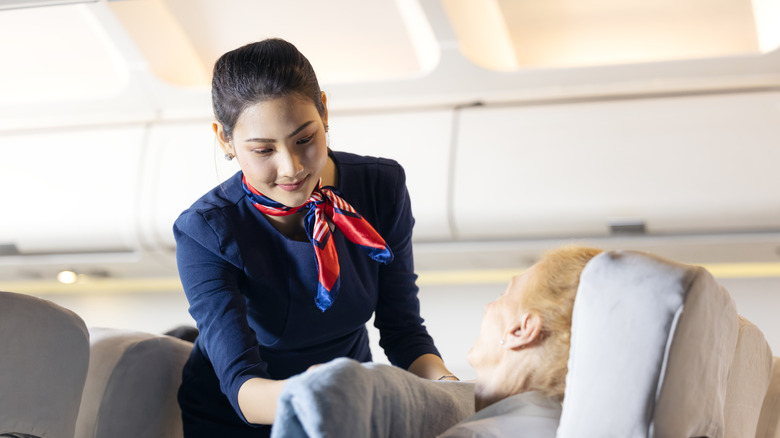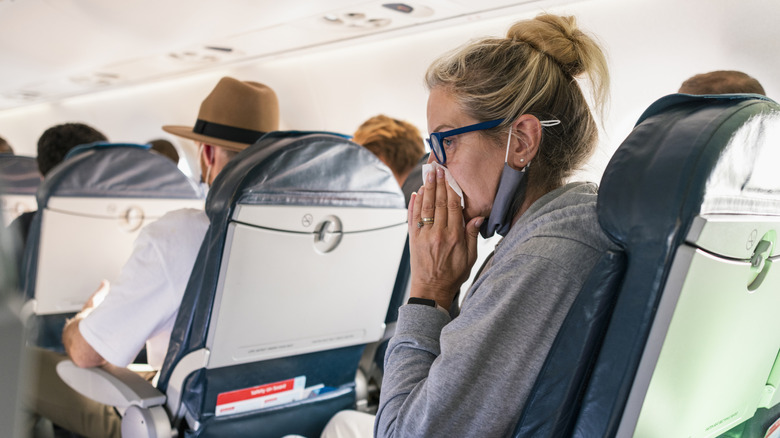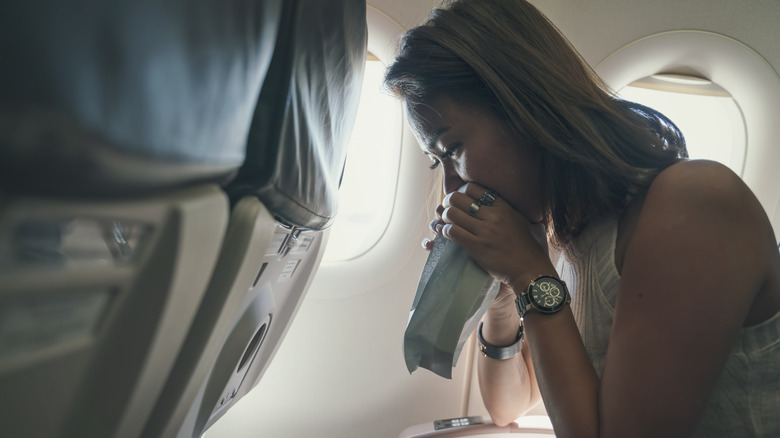The Crucial Step Too Many Travelers Avoid Doing When Feeling Sick On A Plane
After weeks or months of endless planning, the day you've been waiting for has finally arrived. Except that you wake up with a few sniffles, a slight fever, or even an upset stomach. What happens now? Ideally, if you have any contagious symptoms, it is best to cancel or postpone your travel plans. However, depending on the symptoms, many people still fly to prevent financial losses that could occur as a result of not booking a flight with free cancellation.
Flying while healthy can be exhausting, so the physical strain on a body that is already feeling unwell can worsen the symptoms. For your travel safety, as well as those around you, it is best to stay at home if you're not feeling well. While airlines do not allow highly contagious passengers to fly, sometimes people manage to mask their symptoms or they just get really sick on the flight. If this is the case, there is one crucial step that many passengers tend to avoid. This vital step is to alert the crew as soon as possible and keep them updated on your symptoms.
It is understandable to feel shy to speak up, and asking for help isn't always easy. Just remember that a flight attendant's job is to keep passengers safe and comfortable during the flight. In fact, your flight attendant will be able to provide you with mild care if needed or take further actions if your situation escalates.
What medical care can you receive onboard?
Keep in mind that flight attendants are safety professionals who have at least some experience in handling medical issues. As flight attendants, they are required to have medical training to be able to handle minor issues all the way up to emergencies. While they are not doctors, flight attendants will be able to provide you with some care, as every flight is equipped with first aid kits, oxygen supplies, and even connection to ground medical staff. In case of an emergency, the crew will be able to notify the pilot and make an emergency landing if needed. Otherwise, they will provide the necessary care to the best of their abilities.
Flight attendants are eager to ensure every passenger's safety and comfort. If you're feeling nauseous, they can offer remedies such as ginger to help combat nausea, offer ice packs for a fever or back pain, and even escalate the situation to medical staff if needed. That's why it is important to notify the crew as soon as possible to ensure your safety and the safety of other passengers, too.
Tips to follow if you're feeling unwell on a flight
The first step if you're feeling sick while traveling is to assess your symptoms. Mild symptoms will include nausea or dizziness or just feeling tired, whereas potentially severe symptoms will include chest pains, difficulty breathing, or an uncontrollable fever. In all cases, you should immediately start self-care by drinking lots of water, taking any over-the-counter-medication you have in your hand luggage that could ease your discomfort, or ask to be seated in a more spacious seat where you can maybe lie down or recline your seat comfortably if available.
The next step is to alert the cabin crew for practical assistance as soon as possible and communicate your needs clearly. Describe your symptoms as best as possible and ask for assistance when needed. This can be water or electrolytes for hydration, tea with honey for a sore throat, or ginger and crackers if you're struggling with nausea. If your symptoms get worse, notifying the crew will help them determine if they need to connect with medical professionals on the ground or make an emergency landing.
It's best to avoid common triggers that can amplify or worsen your symptoms, such as drinking caffeine or alcohol during the flight. These are known to heighten feelings of nausea or cause dehydration. You can also use breathing and meditation techniques to help you relax and overcome flying anxiety.


